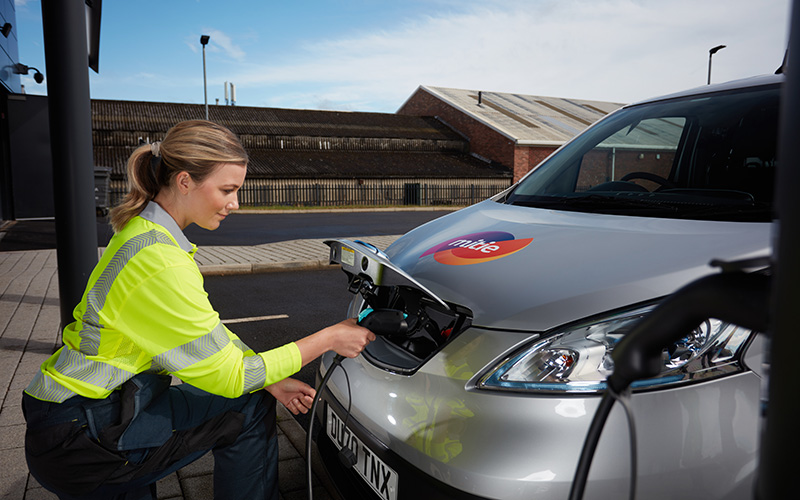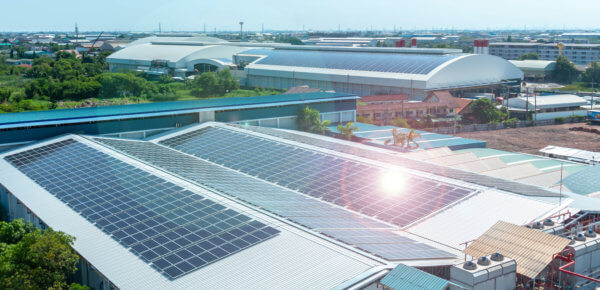Is there really a bump in the road on the switch to EV?

Has the recent dip in UK electric vehicle sales put the brakes on the transition to EV?
There was surprise in many quarters when the Society of Motor Manufacturers and Traders (SMMT) announced registrations of new electric cars dropped from 16.2% in March 2023 to 15.2% in March this year.
But the figures only tell half the story according to Mitie’s Head of Transport Consulting, Matt Dale.
For the second article in the Mitie Perspectives series, Matt argues the acceleration towards EV shows no sign of stopping – and offers his expert opinion on how to keep progress on track.
It’s happened before; new figures suggesting even just a tiny hurdle on the UK’s journey to net zero become headline news.
Recent numbers from SMMT showing a 1% drop in privately purchased and registered EVs are no exception. While the BBC remained relatively matter of fact with its coverage – Electric cars lose share as private sales fall – the same can’t be said of other outlets:
- Is this the end of the EV?
- Electric vehicles lose their spark as share of market shrinks
- Electric car sales continue to falter as more drivers turn to hybrids
I’d like to respond to the question posed by the first headline with a robust ‘No’. Read on to find out why, together with my thoughts on how the move to EV could be better supported.
Overall EV sales are increasing
It’s important to realise the 1% dip in EV sales relates to purchases by private buyers. The SMMT figures show there were actually 48,388 battery electric vehicle sales in March 2024, up almost 4% from 2023. Over the same period diesel vehicle sales dropped by 2.7%, which means things are mostly going in the right direction. Ultimately the UK’s journey to electric is an evolution, not a revolution. It would be silly to think that after years of internal combustion engine (ICE) vehicles, we could flip to electric overnight.

Not all personal EV purchases are recorded as such
There’s been rapid growth in EV salary sacrifice schemes. This means an employer can lease an EV on behalf of a colleague, who gets the car in exchange for sacrificing part of their gross salary. As the sacrificed salary isn’t taxable, the employee can save up to 40% on a new EV. These EV purchases are captured as fleet registrations, even though the person ends up with their own private vehicle. So, while the headline figures show fewer private individuals committing to an EV purchase, some are most likely slipping through the cracks.
It’s misguided to blame a delay in the new petrol and diesel car ban
Several articles mention that Rishi Sunak postponed outlawing new petrol and diesel car sales from 2030 to 2035. They claim this has contributed to fewer people committing to EV. I don’t think that’s the case and to suggest as much paints a false picture of EVs being in terminal decline. The Zero Emission Vehicle mandate is far more relevant. Since January at least 22% of vehicles sold this year must be zero-emission, with the target increasing to 80% by 2030 and 100% by 2035. Manufacturers failing to hit the quotas could be fined £15,000 per car. This legislation will maintain EV sales far more than the delay in the ban will reduce them.
Second hand EV sales are at their highest ever
The figures that created all the headlines relate to new EV sales. However, there wasn’t quite so much fuss in February, when SMMT revealed record sales of second hand EVs rocketed 90.9% between Q4 2022 and 2023. As I said before, the switch to electric is an evolution not a revolution and drivers have good reason for choosing a second-hand EV as they ‘dip a toe’ in this new mode of transport. It’s perfectly reasonable to give EVs a try without the financial commitment of a new vehicle. With fewer moving parts than ICE vehicles, EVs last longer and have lower maintenance costs, which also makes used models attractive. Finally, drivers who are a little cautious about a total switch may be opting for hybrid vehicles in the first instance. While they haven’t gone fully electric, it’s still a step in the right direction.

Let’s supercharge the UK’s switch to electric
So the situation isn’t quite as grim as the headlines suggest. However, the UK’s EV transition strategy is far from perfect. There are a couple of things that could be done to help…
Improve EV education
The switch to electric is a mammoth undertaking. We’re being asked to stop using the fossil fuels that have been around for over 100 years when the electric alternative has only been around for 15 years or so. I don’t believe drivers are being appropriately educated about this major fuel transfer. It’s something Government, manufacturers and the automotive industry could easily address. Recently the Association of Fleet Professionals produced an electric vehicle myth-busters guide to tackle company car driver misconceptions. If the same amount of effort that goes into informing fleets about electrification went into informing consumers, more would have the confidence to buy an EV.
Organisations must drive the transition
A successful move to EV requires organisations, Government and individuals to work together. Many organisations are underplaying their role. On the one hand they want colleagues to decarbonise commutes and transport, but on the other they aren’t providing the means to do so. For example, around 40% of residential properties don’t have off-street parking, which makes charging an electric vehicle at home difficult. Organisations should install EV charging infrastructure at offices to help colleagues in this situation. Across the board there needs to be a more strategic and supportive approach to moving to EV. This will ensure any bumps in the road are easily overcome, without jeopardising the UK’s transition to electric.

Do you agree with Matt? Let us know by emailing planzero@mitie.com.
Read next
Mitie charges ahead as 50% of fleet goes electric
Mitie announces it has reached a major milestone in its decarbonisation journey, having transitioned 50% of its fleet to electric vehicles (EVs). This EV deployment is part of Mitie’s wider Plan Zero pledge, which…

Build a decarbonisation business case that speaks volumes to senior execs
Building a credible business case for decarbonisation matters – but how do you articulate it to senior decision makers? Plan Zero Director, Mike Sewell, explains. There’s no way around it – decarbonisation must become…
Electrify your business fleet – the process of getting an electrical connection
Electric Vehicles [EVs] are thriving. Latest figures from Total affirm that over 150,000 EVs are now recorded in the UK, with numbers expected to reach 1 million in the next couple of years and…